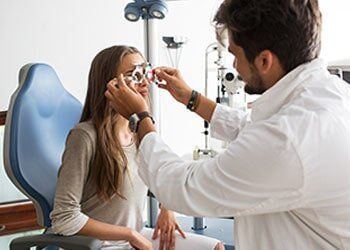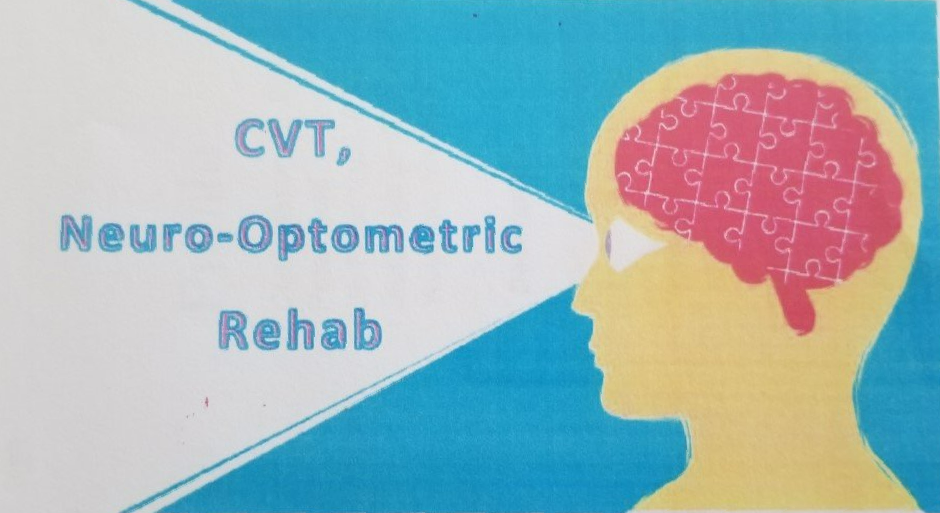Neuro-Optometric Rehabilitation

Neuro-Optometry Rehabilitation
Traumatic brain injury, whiplash or a stroke leave many with a residual impairment of the visual system. This can result in an inability to recuperate because we are visually oriented. So much of our function is guided by or dependent on vision. There is a need for the brain to coordinate visual and other sensory inputs. Loss of function can leave one feeling uneasy and disoriented in certain environments and sometimes is manifested as panic attacks or interruptions in activities of daily living.
Treatments
Specialized testing often uncovers problems that other specialists and tests have failed to detect. MRI's are often negative, yet lack of evidence is not evidence of lack of an injury. These deficiencies are treatable and a person does not have to learn to live with many residual problems or handicaps. Often treatment incorporates Rehabilitation training, by our specially trained therapist, syntonic color therapy and low vision treatment in addition to other neuro-optometric techniques.
Dr. Guhl is a certified and a charter member of NORA (The Neuro-Optometric Rehabilitation Association).
Neuro-Optometric Rehabilitation
This is the process that restores or normalizes various aspects of ocular and perceptual functioning. Just as our body's muscles can be developed, visual capabilities can be improved. This first involves a comprehensive evaluation to determine which functions need improvement. Next, a program that is individually tailored to the capabilities of the patient is implemented. This would involve in-office treatment by our team of therapist, evaluation and training as well as home exercises.
Behavioral Vision Care
A behavioral optometrist studies the effects developmental issues and stress on vision. Through the use of carefully selected stress-relieving, preventive lenses and therapy, you can enjoy relief from even the most stressful close-up visual conditions
If you experience headaches, blurred vision, tired, itchy or watery eyes or other vision-linked problems, you may already know how uncomfortable sustained visual stress can feel. Your discomfort may be related to the heavy vision load of working at near distance.
Dr.Guhl has studied the effects of stress on vision. Through the use of carefully selected stress-relieving and preventive lenses and visual training, you can enjoy relief from even the most stressful close-up visual conditions.
Who Might Need a Behavioral Optometrist?
- Children of all ages, but especially pre-school children just starting school.
- Children who are having trouble with reading or learning.
- Children who seem to be uncoordinated in visually demanding sports.
- Children who are considered "behavior problems."
- Children who are reading "below their potential."
- Children diagnosed with ADD/ADHD.
- Children who are uncoordinated.
- Anyone who participates in athletics and wants improved performance.
- Anyone who works at a computer.
- Anyone who has a visually demanding job.
- Anyone who suffers from burning, itchy eyes, eye strain or visual fatigue (with no medical eye problem).
- Stroke patients.
- Anyone who suffers from chronic fatigue.
Syntonic Color therapy
Syntonic Phototherapy may be today's most advanced clinical science in light therapy. Since the 1920's it has been used effectively by optometrists to treat patients who have an inefficient visual function.
Patients are diagnosed by symptoms, vision evaluation, visual/motor performance and peripheral vision sensitivity. They may have blurred vision, a crossed or lazy eye, double vision or poor academic achievement. If appropriate, they are treated by way of their eyes with selected visible light seen as colors.
Indications for Syntonic Phototherapy
- Visual Blurred vision
- Eye turn (Strabismus)
- Lazy eye (Amblyopia)
- Double vision
- Reduced peripheral vision
- Eye strain
- Visually-related Headaches
- Academic under-achievement
- Poor attention and memory
- Reading problems
- Poor coordination
- behavioral vision therapy optometrists in Virginia
Adverse Visual Effects can be caused by
- Stroke
- Head Trauma
- Concussions
- Headaches while reading or near tasks
Low Vision Therapy
When vision is sub-normal or reduced it is referred to as Low Vision. This can refer to a loss of central visual acuity, which is the well-known 20/20 reference. It can refer to a loss of peripheral vision, Sometimes glare or other problems can interfere with vision. Diseases, Cataracts, Glaucoma, Diabetes, Injuries, or Developmental issues can be the cause of low vision. When surgery or other treatments are not viable solutions a permanent impairment may result.
CALL US TODAY
Low vision therapy provides the potential for improved work prospects, school mainstreaming and improved activities of daily living, including driving. Improved comfort and independence are frequent outcomes.


Neuro-Optometry
Traumatic brain injury, whiplash or a stroke leave many with a residual impairment of the visual system. This can result in an inability to recuperate because we are visually oriented. So much of our function is guided by or dependent on vision. There is a need for the brain to coordinate visual and other sensory inputs. Loss of function can leave one feeling uneasy and disoriented in certain environments and sometimes is manifested as panic attacks or interruptions in activities of daily living.
Treatments
Specialized testing often uncovers problems that other specialists and tests have failed to detect. MRI's are often negative, yet lack of evidence is not evidence of lack of an injury. These deficiencies are treatable and a person does not have to learn to live with many residual problems or handicaps. Often treatment incorporates vision training, syntonic and low vision treatment in addition to the neuro-optometric techniques.
Dr. Guhl is a certified and a charter member of NORA (The Neuro-Optometric Rehabilitation Association).
Vision Theraphy
Vision Training is the process that restores or normalizes various aspects of ocular and perceptual functioning. Just as our body's muscles can be developed, visual capabilities can be improved. This first involves a comprehensive evaluation to determine which functions need improvement. Next, a program that is individually tailored to the capabilities of the patient is implemented. This would involve in-office treatment, evaluation, and training as well as home exercises.
Behavioral Vision Care
A behavioral optometrist studies the effects of stress on vision. Through the use of carefully selected stress-relieving and preventive lenses and visual training, you can enjoy relief from even the most stressful close-up visual conditions
If you experience headaches, blurred vision, tired, itchy or watery eyes or other vision-linked problems, you may already know how uncomfortable sustained visual stress can feel. Your discomfort may be related to the heavy vision load of working at near distance.
Dr.Guhl has studied the effects of stress on vision. Through the use of carefully selected stress-relieving and preventive lenses and visual training, you can enjoy relief from even the most stressful close-up visual conditions.
Who Might Need a Behavioral Optometrist?
- Children of all ages, but especially pre-school children just starting school.
- Children who are having trouble with reading or learning.
- Children who seem to be uncoordinated in visually demanding sports.
- Children who are considered "behavior problems."
- Children who are reading "below their potential."
- Children diagnosed with ADD/ADHD.
- Children who are uncoordinated.
- Anyone who participates in athletics and wants improved performance.
- Anyone who works at a computer.
- Anyone who has a visually demanding job.
- Anyone who suffers from burning, itchy eyes, eye strain or visual fatigue (with no medical eye problem).
- Stroke patients.
- Anyone who suffers from chronic fatigue.
Syntonic Color therapy
Syntonic Phototherapy may be today's most advanced clinical science in light therapy. Since the 1920's it has been used effectively by optometrists to treat patients who have an inefficient visual function.
Patients are diagnosed by symptoms, vision evaluation, visual/motor performance and peripheral vision sensitivity. They may have blurred vision, a crossed or lazy eye, double vision or poor academic achievement. If appropriate, they are treated by way of their eyes with selected visible light seen as colors.
Indications for Syntonic Phototherapy
- Visual Blurred vision
- Eye turn (Strabismus)
- Lazy eye (Amblyopia)
- Double vision
- Reduced peripheral vision
- Eye strain
- Visually-related Headaches
- Academic under-achievement
- Poor attention and memory
- Reading problems
- Poor coordination
- behavioral vision therapy optometrists in Virginia
Visual Effects
- Stroke
- Head Trauma
- Concussions
- Anyone who suffers from headaches while reading or near tasks
Low Vision Therapy
When vision is sub-normal or reduced it is referred to as Low Vision. This can refer to a loss of central visual acuity, which is the well-known 20/20 reference. It can refer to a loss of peripheral vision, Sometimes glare or other problems can interfere with vision. Diseases, Cataracts, Glaucoma, Diabetes, Injuries, or Developmental issues can be the cause of low vision. When surgery or other treatments are not viable solutions a permanent impairment may result.
COME IN TODAY
Low vision therapy provides the potential for improved work prospects, school mainstreaming and improved activities of daily living, including driving. Improved comfort and independence are frequent outcomes.


Neuro-Optometry
Traumatic brain injury, whiplash or a stroke leave many with a residual impairment of the visual system. This can result in an inability to recuperate because we are visually oriented. So much of our function is guided by or dependent on vision. There is a need for the brain to coordinate visual and other sensory inputs. Loss of function can leave one feeling uneasy and disoriented in certain environments and sometimes is manifested as panic attacks or interruptions in activities of daily living.
Treatments
Specialized testing often uncovers problems that other specialists and tests have failed to detect. MRI's are often negative, yet lack of evidence is not evidence of lack of an injury. These deficiencies are treatable and a person does not have to learn to live with many residual problems or handicaps. Often treatment incorporates vision training, syntonic and low vision treatment in addition to the neuro-optometric techniques.
Dr. Guhl is a certified and a charter member of NORA (The Neuro-Optometric Rehabilitation Association).
Vision Therapy
Vision Training is the process that restores or normalizes various aspects of ocular and perceptual functioning. Just as our body's muscles can be developed, visual capabilities can be improved. This first involves a comprehensive evaluation to determine which functions need improvement. Next, a program that is individually tailored to the capabilities of the patient is implemented. This would involve in-office treatment, evaluation, and training as well as home exercises.
Behavioral Vision Care
A behavioral optometrist studies the effects of stress on vision. Through the use of carefully selected stress-relieving and preventive lenses and visual training, you can enjoy relief from even the most stressful close-up visual conditions
If you experience headaches, blurred vision, tired, itchy or watery eyes or other vision-linked problems, you may already know how uncomfortable sustained visual stress can feel. Your discomfort may be related to the heavy vision load of working at near distance.
Dr.Guhl has studied the effects of stress on vision. Through the use of carefully selected stress-relieving and preventive lenses and visual training, you can enjoy relief from even the most stressful close-up visual conditions.
Who Might Need a Behavioral Optometrist?
- Children of all ages, but especially pre-school children just starting school.
- Children who are having trouble with reading or learning.
- Children who seem to be uncoordinated in visually demanding sports.
- Children who are considered "behavior problems."
- Children who are reading "below their potential."
- Children diagnosed with ADD/ADHD.
- Anyone who participates in athletics and wants improved performance.
- Anyone who works at a computer.
- Anyone who has a visually demanding job.
- Anyone who suffers from burning, itchy eyes, eye strain or visual fatigue (with no medical eye problem).
- Stroke patients.
- Anyone who suffers from chronic fatigue.
Syntonic Color therapy
Syntonic Phototherapy may be today's most advanced clinical science in light therapy. Since the 1920's it has been used effectively by optometrists to treat patients who have an inefficient visual function.
Patients are diagnosed by symptoms, vision evaluation, visual/motor performance and peripheral vision sensitivity. They may have blurred vision, a crossed or lazy eye, double vision or poor academic achievement. If appropriate, they are treated by way of their eyes with selected visible light seen as colors.
Indications for Syntonic Phototherapy
- Visual Blurred vision
- Eye turn (Strabismus)
- Lazy eye (Amblyopia)
- Double vision
- Reduced peripheral vision
- Eye strain
- Visually-related Headaches
- Academic under-achievement
- Poor attention and memory
- Reading problems
- Poor coordination
- behavioral vision therapy optometrists in Virginia
Visual Effects
- Stroke
- Head Trauma
- Concussions
- Anyone who suffers from headaches while reading or near tasks
Low Vision Therapy
When vision is sub-normal or reduced it is referred to as Low Vision. This can refer to a loss of central visual acuity, which is the well-known 20/20 reference. It can refer to a loss of peripheral vision, Sometimes glare or other problems can interfere with vision. Diseases, Cataracts, Glaucoma, Diabetes, Injuries, or Developmental issues can be the cause of low vision. When surgery or other treatments are not viable solutions a permanent impairment may result.
COME IN TODAY
Low vision therapy provides the potential for improved work prospects, school mainstreaming and improved activities of daily living, including driving. Improved comfort and independence are frequent outcomes.





